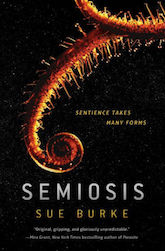Semiosis is Sue Burke’s first novel. It’s a braided narrative, taking place over several human generations, and involves questions of community, communication, power, civilisation, memory, history, and compromise. For all its ambition, Semiosis is a fairly slender volume. It’s also an easy read, and a pretty compelling one.
The novel opens with a small human colony—fifty-odd people set out, with a store of sperm and ova to avoid the problems of inbreeding—landed and settled, rather precariously, on a planet they have named Pax. They intend to create a utopia, free of the problems that dogged Earth: violence, religious oppression, inequality. But Pax is an older planet than Earth, and its biosphere has had longer to evolve. The colonists discover that some of Pax’s plants are intelligent in their own way. The first generation of colonists become, essentially, the servants of a plant they call the snow vine. Their story is recounted by Octavo, the colony’s botanist, as he investigates the mystery of their new environment and comes to hate and resent their new plant overlords.
Buy the Book


Each generation faces a new challenge and a new mystery. For Sylvia, a woman of the colony’s second generation, it’s the challenge of getting the colony out from under the thumb of the frightened and controlling older generation—timid because they know the risks, willing to resort to murder and beatings because in their fear they’ve turned to violence—when she discovers an abandoned city (surrounded by a rainbow bamboo plant) that could provide the colony with more security and a better way of life. The colony is afraid the bamboo will be a worse plant overlord than the snow vine, and Sylvia is eventually spurred to confront their hypocrisy with violence of her own.
Higg is a child of the third generation. It’s his generation, living in the half-repaired ruins of an abandoned alien city, dealing with child mortality and health issues, that has to figure out how to communicate with the rainbow bamboo—because the rainbow bamboo has finally made an overture that looks like an attempt at communication. It is here, too, that Burke finally writes from the plant’s point of view, giving us a very alien kind of viewpoint. A plant, communicating with mammals!
The next generations deal with murder, the rainbow bamboo—which learns to speak the language of mammals, takes the name of Stevland, becomes a citizen of the community, and eventually becomes the community’s co-moderator—and the rediscovery of the aliens who built the city in the first place, now nomadic and suffering severe social disruptions that eventually lead them to violent clashes with the Pax community, which is suffering from its own social disruption because of the presence of an outside threat. Stevland and most of the Pax community want to figure out how to incorporate at least some of the aliens into their community as eventual equals, but achieving this goal will be a challenge fraught with danger and losses.
Semiosis is a quiet, measured sort of science fiction, concerned with signs and meanings, and with the things that underlie those signs. Throughout, Burke maintains a dialogue about power—power that individuals may hold over other people, and the power that Stevland potentially and actually holds over the humans in the Pax community—and the ethics of how that power can be used, refused, or moderated. The thematic argument at the heart of Burke’s novel is about the nature of civilisation, and the choices people make about what kind of community, and what kind of civilisation, they’re going to build. There’s a deep vein of kindness running through Semiosis, an understated understanding for the weaknesses and flaws of all sentient beings. In its willingness to take the long view and its treatment of successive generations, it reminds me a little of Adrian Tchaikovsky’s award-winning Children of Time—though Burke lacks Tchaikovsky’s minor obsession with spiders, which those of us who find arachnids discomfiting will appreciate.
Each of Burke’s characters come to life as individuals: she has an excellent grasp of voice and characterisation. Stevland is perhaps a little too human for an alien plant, but it is difficult to portray true alienness that is still sympathetic and comprehensible. I do feel that Semiosis would be a stronger book if at least one of the five major human viewpoint characters had not come across as a cisgender straight person: a future attempted-utopian society where there are no prominent queer people rather strains at my disbelief. But that aside, Semiosis is a very strong debut, and well worth checking out.
Semiosis is available now from Tor Books.
Read an excerpt from the novel here.
Liz Bourke is a cranky queer person who reads books. She holds a Ph.D in Classics from Trinity College, Dublin. Her first book, Sleeping With Monsters, a collection of reviews and criticism, is out now from Aqueduct Press. Find her at her blog, where she’s been known to talk about even more books thanks to her Patreon supporters. Or find her at her Twitter. She supports the work of the Irish Refugee Council and the Abortion Rights Campaign.










